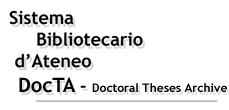|
|
DocTA - Doctoral Theses Archive >
Tesi di dottorato >
CORSO DI DOTTORATO IN PERSONA E ORDINAMENTI GIURIDICI >
Citazione:
Utilizza queste indicazioni per citare o creare un link a questo documento.
|
Chiesi, Valentina. "DIRITTO E SISTEMA NEL TEMPO. SUL RAPPORTO 'DIRITTO-TEMPO' ALLA PROVA DEL SISTEMA GIURIDICO PRIMA E DOPO LUHMANN", Università Cattolica del Sacro Cuore, XXXV ciclo, a.a. 2021/22, Milano, [http://hdl.handle.net/10280/152134].
|
| Titolo: | DIRITTO E SISTEMA NEL TEMPO. SUL RAPPORTO 'DIRITTO-TEMPO' ALLA PROVA DEL SISTEMA GIURIDICO PRIMA E DOPO LUHMANN |
| Autore/i: | CHIESI, VALENTINA |
| Tutor: | BOMBELLI, GIOVANNI |
| Coordinatore: | NICOLUSSI, ANDREA |
| Lingua: | ITA |
| Abstract in italiano della tesi: | La presente ricerca ha l’obiettivo di avanzare alcune riflessioni sul complesso, nonché amplissimo, rapporto tra il diritto e la categoria della temporalità. Essa muove dalla convinta opportunità di affiancare ai numerosi studi sulle trasformazioni contemporanee di carattere spaziale (e.g. sul diritto globale, transnazionale, sovranazionale), riflessioni specificamente dedicate al tempo, sulla scia di un’ormai consolidata letteratura filosofico-sociologica impegnata nell’analisi dei tratti più significativi che oggi assume tale dimensione (i.e. presentificazione, accelerazione, aleatorietà). Per conferire coerenza al lavoro, si è deciso di assumere il sistema giuridico come griglia teorico-metodologico entro cui svolgere il ragionamento, selezionando alcune prospettive utili a mettere in luce come sussista una tendenziale corrispondenza tra il modo in cui si è delineato il rapporto tra diritto e sistema e il significato più o meno pregnante conferito alla temporalità. In un primo momento, assumendo la teoria della consuetudine come ‘chiave di accesso’ prediletta per riflettere sul tema, si sono indagate – con un approccio storico-comparatistico – la dottrina della Scuola storica del diritto e quella ‘positivistica’ tracciata da Hobbes, Bentham e Kelsen. Successivamente, ci si è a lungo dedicati alla teoria dei sistemi sociali di Luhmann, nella quale emerge un’inedita declinazione teorica del concetto di sistema, alla luce, in particolare, del paradigma dell’autopoieticità; essa è dunque apparsa centrale per poter cogliere alcune tendenze tardo-novecentesche che investono non solo la società complessivamente intesa, ma il diritto stesso come sottosistema autonomo. Sulla scia delle riflessioni luhmanniane in tema di imperintegrazione, ‘overstrain’ e contingenza, le ricerche di Teubner sul diritto riflessivo e di Rosa sull’accelerazione sociale hanno consentito di spostare lo sguardo alla contemporaneità, rispetto alla quale sembra consolidarsi la necessità di ricorrere a ‘nuove metafore’ che, tra teoria e prassi, offrano cornici epistemologiche inedite entro cui collocare una realtà giuridico-normativa a vocazione sempre più a-sistematica e a-sistemica. Dopo aver approfondito quello reticolare come il modello che più consente di tenere insieme i numerosi elementi connotativi dell’odierno scenario socio-giuridico (i.e. la globalizzazione, la governance, l’ibridismo pubblico-privato, la trasfigurazione delle fonti del diritto), si è potuto altresì ipotizzare la ri-emersione di alcune ‘categorie-fenomeno’ tipicamente moderne (i.e. consuetudine, codice, costituzione, legislazione) ri-plasmate tuttavia dalla discussa questione dell’effettività e da una nuova idea di temporalità (in particolare, si fa riferimento al presunto carattere consuetudinario del diritto contemporaneo, ai c.d. Codes of conduct, alla teoria delle costituzioni sociali di Teubner, alla c.d. experimental law). In via conclusiva, è apparso interessante richiamare le proposte teoriche di Husserl e Ost & De Kerchove ove viene tentata una ‘tipizzazione ideale’ della temporalità giuridica, aprendo ad ulteriori riflessioni oggi più che mai attuali e rispetto alle quali la dimensione del tempo, e in particolare del futuro, torna ad essere centrale: prima fra tutte, la responsabilità intergenerazionale. |
| Abstract in inglese: | This research is aimed at setting out some reflections on the complex interplay between the law and temporality.
It’s rooted into the conviction that it’s now worth adding in some ad hoc reflections on Time to the many studies on transformations that are currently taking place over Space (e.g. on global, transnational and supranational law); and this is done in the wake of an established philosophical-sociological literature committed to analysing the most meaningful features that Time takes on today (i.e. presentification, acceleration, aleatoriness). To ensure consistency throughout this work, the legal system was taken as the theoretical-methodological grid where the reasoning is carried out, by selecting some useful perspectives to raise awarness over a tendency being in place towards the way in which the relationship between law and the system has been delineated and the more or less pregnant meaning given to temporality, correspond with each other. At first, taking the theory of customs as the preferred 'key' for reflecting on the topic, the doctrine of the historical school of law and the 'positivist' doctrine traced by Hobbes, Bentham and Kelsen were looked at with a historical-comparative approach. Subsequently, we devoted ourselves at length to Luhmann's theory of social systems, in which an unprecedented theoretical declination of the concept of the system emerges, in the light, in particular, of the paradigm of autopoieticity; it thus appeared central to being able to grasp certain late twentieth-century tendencies that embrace not only society as a whole, but law itself as an autonomous subsystem. Following on Luhmann’s reflections on imperintegration, 'overstrain' and contingency, Teubner's research on reflexive law and Rosa's on social acceleration have made it possible to shift our gaze to contemporaneity, in respect of which the need to resort to 'new metaphors' seems to be consolidating, which, between theory and practice, outline unprecedented epistemological frameworks where a legal-normative reality with an increasingly a-systematic and a-systemic vocation is placed into. After having examined the reticular model as the model that best enables the numerous connotative elements of today's socio-legal scenario (i.e. globalisation, governance, public-private hybridism, the transfiguration of the sources of law) to be held together, it was also possible to figure out the re-emergence of certain typically modern 'phenomenon-categories' (i.e. custom, code, constitution, legislation) re-moulded, however, by the debated question of effectiveness and by a new idea of temporality (in particular, reference is made to the assumed customary character of contemporary law, to the Codes of Conduct, to Teubner's theory of social constitutions, and to the so-called experimental law). By way of conclusion, it seemed interesting to recall the theoretical proposals of Husserl and Ost & De Kerchove who attempted to provide an 'ideal typification' of legal temporality, paving the way for further reflections that are more topical than ever today and with respect to which the dimension of time, and in particular of the future, once again becomes central: first and foremost, intergenerational responsibility. |
| Data di discussione: | 17-lug-2023 |
| URI: | http://hdl.handle.net/10280/152134 |
| È visualizzato nelle collezioni: | FACOLTA' DI GIURISPRUDENZA
CORSO DI DOTTORATO IN PERSONA E ORDINAMENTI GIURIDICI
|
File in questo documento:
| File |
Dimensioni | Formato | Accessibilità |
|---|
| tesiphd_completa_Chiesi.pdf | 3,56 MB | Adobe PDF | non consultabile
|
|
Accesso e utilizzo dei contenuti di DocTA
|



